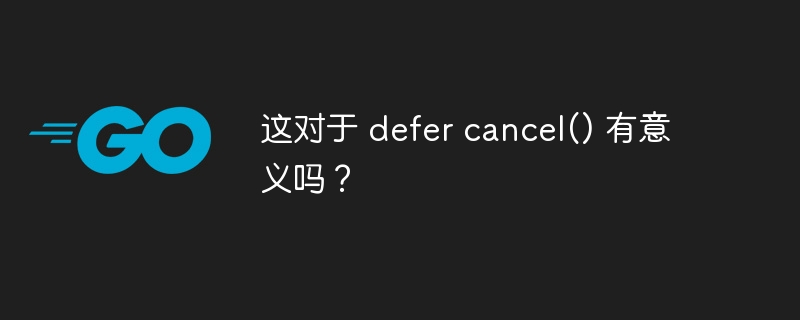

in http.HandlerFunc 中我得到了这个。但我的问题是:在应用超时上下文之后放置 defer cancel() sinnvoll?
Weil die untere Auswahl weiter zuhört, bis der Kontext abgeschlossen ist. Und die Verzögerung wird ausgeführt, nachdem der Kontext abgeschlossen ist. Aber ist das erledigt? :)
// Apply timeout context
var cancel context.CancelFunc
ctx, cancel = context.WithTimeout(ctx, time.Duration(time.Duration(match_route.timeout) * time.Second))
defer cancel() // <--- does this make sense
go func(){
match_route.handler(w, r.WithContext(ctx))
cancel()
}()
select {
case <-ctx.Done():
if ctx.Err() == context.DeadlineExceeded {
http.Error(w, "Timeout", http.StatusRequestTimeout)
}
}Ja, ich denke, das macht Sinn. Verwenden Sie tatsächlich die defer cancel() 的目的是确保调用 cancel 函数来释放与上下文关联的资源,无论函数如何退出,在您的示例中, cancel() 函数被推迟到 http.HandlerFunc 完成后或上下文完成时执行,因此 go func() 负责使用提供的上下文执行 match_route.handler 函数,然后调用 cancel()显式取消上下文,select-Anweisung, um zu warten, bis der Kontext abgeschlossen ist. Wenn der Kontext aufgrund einer Fristüberschreitung abgeschlossen wird, wird eine Fehlerantwort zurückgegeben!
Das obige ist der detaillierte Inhalt vonIst das mit defer cancel() sinnvoll?. Für weitere Informationen folgen Sie bitte anderen verwandten Artikeln auf der PHP chinesischen Website!
 So fügen Sie Seitenzahlen in ppt ein
So fügen Sie Seitenzahlen in ppt ein
 Was ist eine Inline-Funktion?
Was ist eine Inline-Funktion?
 So verweisen Sie auf CSS in HTML
So verweisen Sie auf CSS in HTML
 Wie lautet die Kundendienst-Telefonnummer von Meituan Food Delivery?
Wie lautet die Kundendienst-Telefonnummer von Meituan Food Delivery?
 Welche Funktionen gibt es zum Erstellen von Websites?
Welche Funktionen gibt es zum Erstellen von Websites?
 Windows Boot Manager
Windows Boot Manager
 Öffnen Sie den Home-Ordner auf dem Mac
Öffnen Sie den Home-Ordner auf dem Mac
 ppt Seitenzahl einfügen
ppt Seitenzahl einfügen




